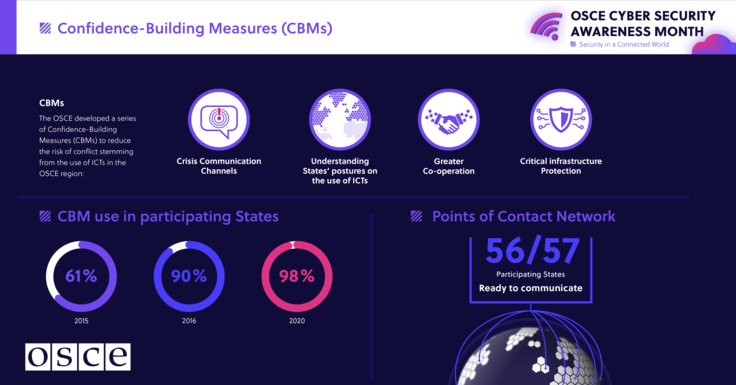-
Our work
-
Fields of work
- Arms control
- Border management
- Combating trafficking in human beings
- Conflict prevention and resolution
- Countering terrorism
- Cyber/ICT Security
- Democratization
- Economic activities
- Education
- Elections
- Environmental activities
- Gender equality
- Good governance
- Human rights
- Media freedom and development
- Migration
- National minority issues
- Policing
- Reform and co-operation in the security sector
- Roma and Sinti
- Rule of law
- Tolerance and non-discrimination
- Youth
- Field operations
- Projects
-
Meetings and conferences
- Summit meetings
- Review Conferences
- Ministerial Council meetings
- Plenary meetings of the Permanent Council
- Plenary Meetings of the Forum for Security Co-operation
- Security Review Conferences
- Annual Implementation Assessment Meetings
- Economic and Environmental Forum
- Economic and Environmental Dimension Implementation Meetings
- Human rights meetings
- Media conferences
- Cyber/ICT security conferences
- Conference of the Alliance against Trafficking in Persons
- Gender equality conferences
- Annual OSCE Mediterranean conferences
- Annual OSCE Asian conferences
- Partnerships
-
Fields of work
-
Countries
- All
-
Participating States
- Albania
- Andorra
- Armenia
- Austria
- Azerbaijan
- Belgium
- Belarus
- Bosnia and Herzegovina
- Bulgaria
- Canada
- Croatia
- Cyprus
- Czechia
- Denmark
- Estonia
- Finland
- France
- Georgia
- Germany
- Greece
- Holy See
- Hungary
- Iceland
- Ireland
- Italy
- Kazakhstan
- Kyrgyzstan
- Latvia
- Liechtenstein
- Lithuania
- Luxembourg
- Malta
- Moldova
- Monaco
- Mongolia
- Montenegro
- The Netherlands
- North Macedonia
- Norway
- Poland
- Portugal
- Romania
- Russian Federation
- San Marino
- Serbia
- Slovakia
- Slovenia
- Spain
- Sweden
- Switzerland – OSCE Chairpersonship 2026
- Tajikistan
- Türkiye
- Turkmenistan
- Ukraine
- United Kingdom
- United States of America
- Uzbekistan
- Asian Partners for Co-operation
- Mediterranean Partners for Co-operation
-
Structures and institutions
- Chairpersonship
-
Secretariat
- Secretary General
- Office of the Secretary General
- Conflict Prevention Centre
- Transnational Threats Department
- Office of the Special Representative and Co-ordinator for Combating Trafficking in Human Beings
- Office of the Co-ordinator of OSCE Economic and Environmental Activities
- Gender Issues Programme
- Opportunities for Youth
- Department of Human Resources
- Department of Management and Finance
- Office of Internal Oversight
- Documentation Centre in Prague
- Institutions
-
Field operations
- Presence in Albania
- Centre in Ashgabat
- Programme Office in Astana
- Programme Office in Bishkek
- Mission to Bosnia and Herzegovina
- Programme Office in Dushanbe
- Mission in Kosovo
- Mission to Moldova
- Mission to Montenegro
- Mission to Serbia
- Mission to Skopje
- Project Co-ordinator in Uzbekistan
- Closed field activities
- Parliamentary Assembly
- Court of Conciliation and Arbitration
- Organizational structure
- About us

Story
OSCE Cyber Security Awareness Month
- Date:
- Source:
- OSCE Secretariat
- Fields of work:
- Cyber/ICT Security
For the first time the OSCE is joining the Cybersecurity Awareness Month initiative in 2020. During October, the OSCE will highlight common cyber security threats, reflect on challenges and developments, and co-organize a series of webinars.
Confidence-building Measures (CBMs)
The key instrument within the OSCE’s toolbox to reduce the risks of inter-State conflict in cyberspace are the 16 ground-breaking Confidence Building Measures (CBMs) that the Organization’s 57 participating States have agreed on in recent years. They are designed to enhance transparency and build trust among States through communication and dialogue.
As a tool for enhancing transparency, States can use CBMs to share national perceptions of threats stemming from cyberspace, strategic and legislative documentation on cyber/ICT security, or approaches to classifying incidents affecting critical infrastructures. They can be used to promote co-operation through, among others, a network of national Points of Contact and joint capacity-building efforts.
CBMs are designed with practical application in mind and are only considered “implemented” by an OSCE participating State if actively used – in 2020, 98% of participating States have implemented at least one CBM, the highest rate since their inception.
An example of how CBMs might be used in the event of a cyber incident in the future: designated national Points of Contact (under CBM 8) can use shared details to immediately contact one another and use the OSCE Communication Network and templates developed under CBM 13 to safely and quickly request information or assistance.
Impact of the COVID-19 pandemic on cyber/ICT security
The COVID-19 pandemic has highlighted our dependence on digital technology and accelerated the digitalization of society. There has been a sharp increase in the use of digital services, from online learning and teleworking, to essential services like banking and healthcare. However, this has not come without unique risks. Criminals were quick to adapt to the new reality by using COVID-19 as a lure to breach systems, in particular through phishing campaigns, ransomware attacks and cyber espionage. These developments have reignited the debate on how to better protect our essential services and critical infrastructure.
What do OSCE Field Operations do to support host countries?
OSCE Field Operations assist host countries in putting their OSCE commitments into practice, such as in the national implementation of cyber/ICT security Confidence-building Measures. At the same time, Field Operations play an important role in supporting national authorities in developing national cyber/ICT security capacities, such as through training courses and workshops. For example, by providing support in the development of national cybersecurity strategies as well as in the establishment of national working groups aiming to co-ordinate national approaches on cyber/ICT issues.
To learn more about OSCE Field Operations’ activities on Cyber/ICT security visit: https://www.osce.org/where-we-are
OSCE Impact
Discover more stories about how the OSCE improves lives.




